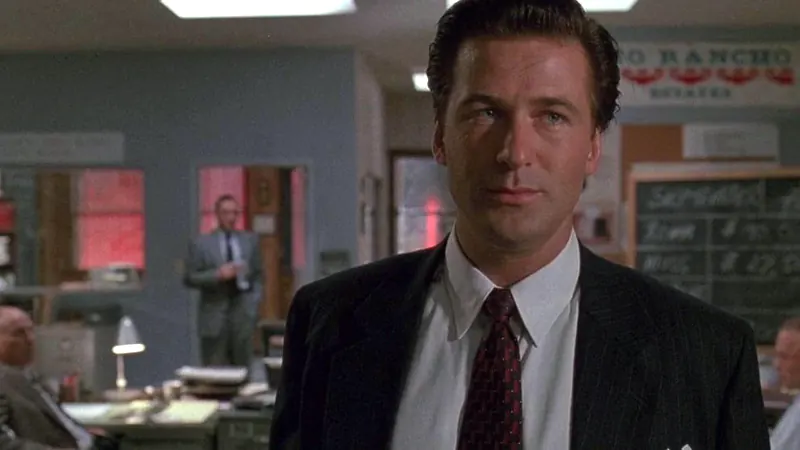Alec Baldwin's Speech As "Blake"
When I interviewed James Foley, the unassuming director of Glengarry Glen Ross, he acknowledged that Mamet had been a strong presence on the set, which was no surprise, knowing that this movie was Mamet’s own adaptation of his most important play. Foley didn’t go as far as saying that Mamet de facto co-directed, but it didn’t seem far off it.
I first heard about David Mamet at the 1986 Venice Film Festival, where I watched two amazing movies penned by him. The Untouchables became a big success for Brian De Palma, and Mamet’s own directorial debut House of Games put Joe Mantegna on the map as a screen actor after he had won a Tony for his performance as Ricky Roma in the Broadway production of Glengarry Glen Ross. The play went on to win the Pulitzer Prize for drama that year, but it would not be adapted for the screen until nine years after its massively successful world premiere in London’s West End in 1983.
THE STORY METAPHOR
Glengarry Glen Ross shows a handful of real estate agents, all struggling to save their jobs on a rainy night in Chicago; and all but one vying for the ‘Glengarry leads’. Each has their own strategy of chasing the precious cards, which are only handed out to ‘closers’.
What is this story really about? It shows the mechanics by which the rich only get richer, as Aaranow (Alan Arkin) states early in the play. It also claims that it takes steel balls to survive the dog eat dog real estate world. Or is Glengarry Glen Ross simply a microcosmos of the American capitalist society? It would be illustrative of Mamet’s liberal views at the time. (He left those ideas behind and converted to the right in 2008.)
To me, the story is - like every truly great story - a metaphor of life. The ‘leads’ are ‘the cards’ we are dealt; some accept them and make the best of it. Others keep fighting them, trying to change what they cannot - and ultimately ending up exhausted, or worse.

THE SCENE AND THE PLAYERS
The stage play was so short, Mamet needed to extend it for the movie version. He added material, including this early scene with a character that didn’t originally exist. Alec Baldwin was cast to play the role of a character who only refers to himself as “Fuck you! That is my name!” This super sales man tells the protagonists early in the movie that they will have to close deals - or lose their jobs. Baldwin embraced the material so brilliantly and vibrantly, it became a career-defining moment for him.
Al Pacino, does not appear in the movie’s most important scene because his character Ricky Roma does his own thing in this world and doesn’t listen to Head Office. Putting him in the scene would have diminished the dramatic impact of the speech, while Al Pacino’s screen presence would have undermined that of Baldwin. The bold move to keep the movie’s biggest star out of its strongest scene resulted in a piece of instant classic cinema, confirming that Mamet is not only a great playwright but an equally brilliant screenwriter.
Karel Segers
Karel Segers wrote his first produced screenplay at age 17. Today he is a story analyst, script editor and producer with experience in rights acquisition, script development and production. His
screenwriting classes have trained writers in Australia, Europe, Asia and the Middle East, and his clients include international award-winning filmmakers as well as three Academy Award nominees.
Karel is the founder of
The Story Department and he ranks in the world's Top 10 of most influential people for screenwriting on Twitter.